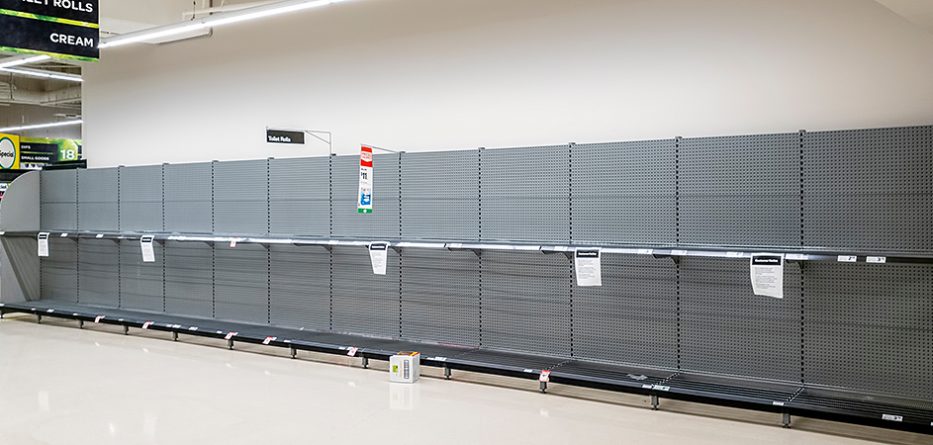We are living in a time of pandemic but it seems so many people have been more focused on panic buying or flouting restrictions on social distancing and public gatherings. Why is it that many are less concerned about the virus than what they can buy or do?
One explanation is that people are making calculations based on factoring in a period of lockdown and social isolation, or the possible threat COVID-19 presents to them personally. Yet, if this is so, then why the panic in buying toilet paper? Or other items that will be re-stocked and replaced if everyone shopped according to their normal pattern?
And why the blasé attitude to infection in Sydney where infection rates are increasing at the highest rate in the country? These are not rational reactions, even if public messaging has not been clear.
We need an alternative explanation to explain our current behaviour and change it. One is provided if we understand humans as highly imitative, social beings.
A supermarket employee put it like this: ‘The question on everyone’s minds at work: Why are they buying everything? One customer summed it up: “Because everyone else is.”‘
Steven Taylor, an expert on the psychology of pandemics, says that panic buying is a sign of human herd behaviour common to pandemics: ‘It always happens. It’s a kind of a mass hysteria.’
The philosopher René Girard argues this kind of hysteria occurs because humans are sophisticated imitators. It is what makes us capable of high levels of learning, socialisation and adaptation. Much psychological research supports the idea that humans are highly imitative. Neurological research indicates that mirror neurons likely influence the process.
Girard identifies our imitative capacity not only how we think but, more fundamentally — in how we desire — that our desire is stimulated by others. Desire is not structured by mythical ‘individual preferences’ but by what we perceive others want.
This imitative or ‘mimetic’ capacity can introduce us to various forms of desiring, which we can freely and rationally choose between. However, it also leads to social contagions in which we imitate each other in intense and irrational ways.
During these social contagions, our desire intensely fires from multiple points of stimulation, such that it is difficult to resist.
As we act on these desires, we compete with others and feel ‘in control’ (as Waleed Aly in The Age noted about panic buyers). At the same time, we validate each other’s desires in a perverse feedback loop.
Girard remarks: ‘In imitating my rival’s desire I give him [or her] the impression that he has good reasons to desire what he desires, to possess what he possesses, and so the intensity of his desire keeps increasing.’ Thus, as we desire the same objects, we become rivals, which intensifies if the objects become scarce. This leads to acquisitive behaviours that become violent, as we’ve seen in supermarkets and shopping centres.
It also leads to selfish and unrealistic demands for desires to be met. We treat each other as instruments or rivals for our desired objects. As a supermarket employee stated: ‘We were being bombarded daily with abuse from the public. They were talking to us like we weren’t even human.’ Because the market is currently unable to satisfy and defuse this contagion of human desires, violent behaviours become more likely.
In a similar way to panic buyers, those flouting government restrictions are acting in mimetic ways. Because others are doing it, the attitude is that it’s ‘okay’ for me to flout public restrictions. It is a pack mentality.
However, this can shift once social pressure becomes overwhelmingly in favour of restrictions. It is, then, that we will find a change in the way most people behave, as they imitate their peers.
In order for this social pressure to arise, public messaging must be clear in emphasising what is at stake and how non-compliant behaviours will have consequences. If people start desiring the survival of themselves and others, this will shift behaviour in a new direction.
Alongside the fear of negative outcomes, positive models and forms of imitation are crucial for a sustained and sensible effort to eradicate COVID-19.
Heroic medical professionals who put themselves at risk to treat the infected are clearly positive role models. They can stimulate better behaviour and everyday heroism, as the viral cry has gone out: ‘We came to work for you. Please stay home for us.’
In this vein, David Brooks argued in The New York Times that we will require social solidarity to get us through this crisis. He defined this solidarity as a form of virtuous action which grows out of Catholic social teaching as ‘an active commitment to the common good’. It is shown in ‘caremongering’ or the ‘kindness pandemic’ where people give out toilet paper, like at Secret Market Square in WA.
In doing this, we show that we are willing to share our objects of desire, rather than fight over them. This is a major social breakthrough. We become more than pre-rational imitators, but self-conscious, social beings who find fulfilment in their solidarity with others.
Sometimes this solidarity calls us to sacrifice for the good of others, over and above the satisfaction of my immediate desires. In the current crisis, this firstly means social distancing and isolation.
A meme comically sums this up: ‘First time in history we can save the human race by laying in front of the TV and doing nothing. Let’s not screw this up.’
Or as Brooks puts it: ‘It’s an odd kind of heroism this crisis calls for. Those also serve who endure and wait.’
Joel Hodge is a lecturer in theology at the Australian Catholic University.
This article was first published in Eureka Street, a publication of the Australian Jesuits. Reproduced with permission.








